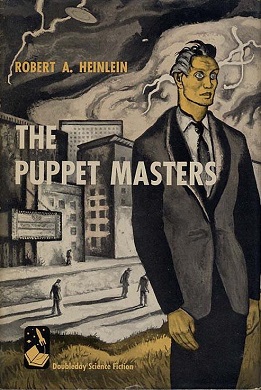The Puppet Masters is one of those stories that gets under my skin for a couple of reasons: first, the confusion with a much more recent series of horror movies, and second because of the obvious parallel with Invasion of the Body Snatchers. Heinlein’s novel was published in 1951, Body Snatchers and the myriad of copies began in 1956. The horror movie series began in the late 1980s.
I’m not sure why, but even when Heinlein’s novels get movie treatment (without being someone else’s knock off) they tend to fall flat. This novel finally got a movie treatment in 1994, but even with a good cast, it came across as a TV movie paying homage to movies like Alien, rather than as a stand alone memorable movie.
The story itself is one of alien invasion through mind control. The protagonist is an agent for a very secret government? agency. If you want the cliff notes version you can rent the movie (Donald Sutherland, Eric Thal, and Julie Warner star). It isn’t great movie making, but it does give a fairly accurate summary of the story and ideas behind the story (as opposed to Star Ship Troopers that barely kept the title intact). The book is a good summer read although not one of my favorites from Heinlein.
Doc



